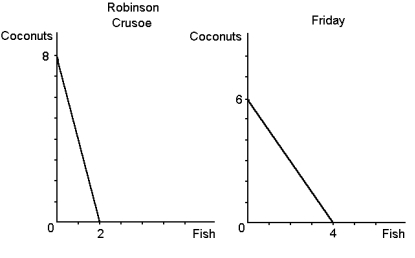Exam 3: Interdependence and the Gains From Trade
Exam 1: Ten Principles of Economics110 Questions
Exam 2: Thinking Like an Economist103 Questions
Exam 3: Interdependence and the Gains From Trade110 Questions
Exam 4: The Market Forces of Supply and Demand152 Questions
Exam 5: Elasticity and Its Application133 Questions
Exam 6: Supply, Demand and Government Policies111 Questions
Exam 7: Consumers, Producers and the Efficiency of Markets127 Questions
Exam 8: Application: the Costs of Taxation105 Questions
Exam 9: Application: International Trade119 Questions
Exam 10: Externalities149 Questions
Exam 11: Public Goods and Common Resources136 Questions
Exam 12: The Design of the Tax System116 Questions
Exam 13: The Costs of Production141 Questions
Exam 14: Firms in Competitive Markets149 Questions
Exam 15: Monopoly159 Questions
Exam 16: Monopolistic Competition158 Questions
Exam 17: Oligopoly and Business Strategy135 Questions
Exam 18: Competition Policy78 Questions
Exam 19: The Markets for the Factors of Production143 Questions
Exam 20: Earnings and Discrimination145 Questions
Exam 21: Income Inequity and Poverty85 Questions
Exam 22: The Theory of Consumer Choice117 Questions
Exam 23: Frontiers of Microeconomics82 Questions
Select questions type
Table 3-3
 -Refer to Table 3-3. The opportunity cost of one car for Europe is:
-Refer to Table 3-3. The opportunity cost of one car for Europe is:
(Multiple Choice)
4.8/5  (40)
(40)
A country's consumption possibilities frontier can be moved outside its production possibilities frontier:
(Multiple Choice)
4.8/5  (46)
(46)
Martha can prepare a meal in one hour, and her opportunity cost of one hour is $50. Stewart can prepare the same kind of meal in two hours and his opportunity cost of one hour is $20. Will both Martha and Stewart be better off if she pays him $45 per meal to prepare her meals? Explain.
(Essay)
4.8/5  (27)
(27)
Table 3-2
 -Refer to Table 3-2. The opportunity cost of 1 kg of butter for Lee is:
-Refer to Table 3-2. The opportunity cost of 1 kg of butter for Lee is:
(Multiple Choice)
4.8/5  (44)
(44)
A butcher can produce only sausages, and a farmer can produce only potato chips. The butcher and the farmer like both foods. They:
(Multiple Choice)
4.9/5  (41)
(41)
Table 3-4
 -According to Table 3-4, if England and Spain do not trade:
-According to Table 3-4, if England and Spain do not trade:
(Multiple Choice)
4.8/5  (39)
(39)
For a country producing two goods, the opportunity cost of one good will be the inverse of the opportunity cost of the other good.
(True/False)
4.7/5  (36)
(36)
The producer who has the smaller opportunity cost of producing a good is said to have a comparative advantage in producing that good.
(True/False)
4.9/5  (35)
(35)
Jack and Catherine have a cooperative project that must be completed for a business class. The project involves doing a series of calculations and writing a report. It would take Jack 10 hours to do the required calculation and 10 hours to write the report. It would take Catherine 12 hours to do the calculations and 20 hours to write the report.
a. How much time would it take the two to complete the project if they divide the calculations equally and the writing equally?
b. How much time would it take the two to complete the project if they use comparative advantage and specialise in calculating or writing?
c. If Catherine and Jack have the same opportunity cost of $5 per hour, is there a better solution than for each to specialise in calculating or writing?
(Essay)
4.9/5  (39)
(39)
Table 3-4
 -Refer to Table 3-4. If England imports cheese from Spain, who will benefit and who will lose?
-Refer to Table 3-4. If England imports cheese from Spain, who will benefit and who will lose?
(Multiple Choice)
4.8/5  (46)
(46)
People's motivation to trade comes from the goods or services they expect to get in return.
(True/False)
4.8/5  (39)
(39)
The conclusions of Adam Smith and David Ricardo on the gains from trade are no longer valid due to the increase of barriers to trade.
(True/False)
4.9/5  (29)
(29)
Graph 3-1
 These figures illustrate the production possibilities frontiers for Robinson Crusoe and Friday with 12 hours of labour.
-According to Graph 3-1:
These figures illustrate the production possibilities frontiers for Robinson Crusoe and Friday with 12 hours of labour.
-According to Graph 3-1:
(Multiple Choice)
4.9/5  (38)
(38)
Spain can produce everything more cheaply than France. What should they do?
(Multiple Choice)
4.8/5  (40)
(40)
Table 3-4
 -Refer to Table 3-4. The opportunity cost of one unit of bread in Spain is:
-Refer to Table 3-4. The opportunity cost of one unit of bread in Spain is:
(Multiple Choice)
4.8/5  (40)
(40)
The principle of absolute advantage explains the gains from trade and why economic interdependence occurs.
(True/False)
4.8/5  (35)
(35)
Graph 3-1
 These figures illustrate the production possibilities frontiers for Robinson Crusoe and Friday with 12 hours of labour.
-Refer to Graph 3-1. For Robinson Crusoe, the opportunity cost of 1 kg of coconuts is:
These figures illustrate the production possibilities frontiers for Robinson Crusoe and Friday with 12 hours of labour.
-Refer to Graph 3-1. For Robinson Crusoe, the opportunity cost of 1 kg of coconuts is:
(Multiple Choice)
4.8/5  (34)
(34)
Mark can cook dinner in 30 minutes and wash the laundry in 20 minutes while his housemate John can cook dinner in 15 minutes and wash the laundry in 30 minutes. How should they allocate their work?
(Multiple Choice)
4.7/5  (36)
(36)
Showing 61 - 80 of 110
Filters
- Essay(0)
- Multiple Choice(0)
- Short Answer(0)
- True False(0)
- Matching(0)